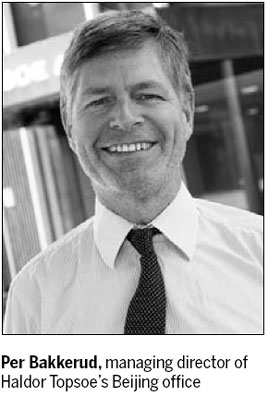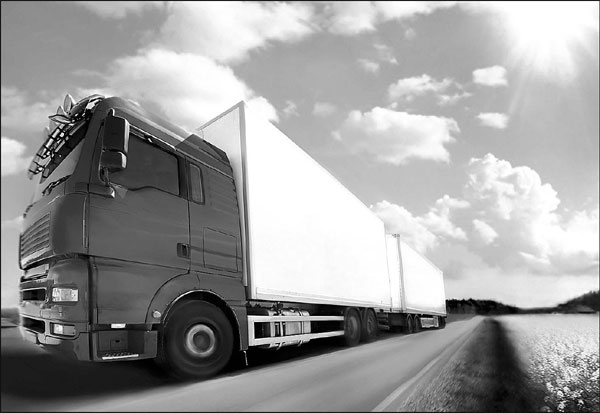Upon returning from Denmark, Per Bakkerud, managing director of catalyst maker Haldor Topsoe's Beijing office, looked out over the capital's skyline and found cause for optimism.
He drew off the curtain of the large French window in his office high above the hustle and bustle of the CBD area.
"At least you can see the buildings in the distance today. During the heavily polluted days, you can almost see nothing out there, only fog," he said, motioning to the tall buildings further away.
For half a century, the Danish company he works has been dedicated to environmental innovations, including technology that can reduce emissions from diesel engines.
|
Topsoe's advanced technologies and catalysts help to reduce emissions in large commercial vehicles. Photos provided to China Daily |
Now Topsoe's technologies and catalysts are used around the world in the transportation sector for reducing emission from heavy-duty vehicles.
Topsoe established its Beijing operations in 1985. In recent years, the company has seen speedy growth in the country.
In the last two years, the number of employees at the Beijing office tripled to 90.
In 2010, Topsoe established a subsidiary following a strategic decision to boost its presence on the market.
During the 2012 Summer Davos in Tianjin, the company signed an investment agreement with Tianjin TEDA to build up an auto catalyst plant in the Nangang Industrial Zone, with the purpose to serve the market more efficiently.
Its catalysts for engines are now installed on more than 2,000 Beijing buses. Its catalyst products have occupied 20 percent of the Chinese market share.
The company projects it will achieve annual revenue of 7 to 8 billion yuan by the year of 2025.
Last year, its revenue was 1 billion yuan ($163 million).
Bakkerud said they are confident the company can reach that goal and this confidence comes from Topsoe's technology, which will reduce emissions on diesel engines without sacrificing dynamics.
Starting in February this year, Beijing began to implement the Beijing V standard, a stricter vehicle emission standard equivalent to the widely applied Euro V standard in many developed countries.
Industry insiders anticipate that the Beijing V standard will be applied to more cities throughout the nation shortly.
Though the timetable is not clear yet, executives at Topsoe predict it will bring more business opportunities.
This May, Topsoe signed a new MOU with Tianjin Nangang Industrial Zone to invest in the second phase of the catalyst plant in the city, which neighbors Beijing."
According to the agreement, Topsoe will invest another 500 million yuan in the plant, which is expected to become operational in 2014, reports said.
But Bakkerud did not officially confirm exactly when the plant will go online.
He said this will be Topsoe's first production base outside Europe and the United States.
However, its investment and scale are still small compared to other overseas facilities.
The reasons for this site selection, he noted, is that it is close to the capital - only half an hour by train.
The administration of the Nangang Industiral Zone is actively working on attracting large foreign investment, and will give a lot of political support to the company.
He has been in China for two years, and said there has been little change in the country's air quality during that time.

However, he said that awareness about the issue is increasing.
"The new leadership talks openly about how bad the air quality is," he noted.
He said that environment protection is becoming an increasingly important issue in the daily lives of the Chinese people and the government's policies.
In the past 30 years, the country has enjoyed rapid economic development.
Maintaining two-digit annual economic growth on average for such a long period is a rare feat now in developed countries.
Present-day Beijing reminds him of London in the 1950s, when it was called "fog city".
As a representative of foreign company in China, he has noted many cultural differences, he said.
One of them is that the people here sometimes lack the patience needed to strike a balance between developing the economy and protecting the environment.
But the country is still full of opportunities, he said.
A foreign company looking to do business here needs to prioritize finding partners, he said.
On the wall of the entrance of Topsoe's Beijing office, there hangs a picture featuring the group's CEO and former Chinese president Hu Jintao.
So far, Topsoe has already worked with the FAW's heavy-duty vehicle department as well as two major domestic diesel engine makers -the Yuchai Group and the Weichai Group.
Although there is no research and development facility in China, Bakkerud said that it will build one in five to 10 years.
Currently, the catalysts used in the country are imported from Topsoe's overseas facilities.
With the Chinese market playing a more and more important role in Topsoe's business, the company will begin making products specifically designed for the country in the future, Bakkerud said.
xuxiao@chinadaily.com.cn
(China Daily 09/11/2013 page27)






